
-
Find the right food for your petTake this quiz to see which food may be the best for your furry friend.Find the right food for your petTake this quiz to see which food may be the best for your furry friend.Featured products
 Perfect Weight Small & Mini Adult Dog Food
Perfect Weight Small & Mini Adult Dog FoodHill's Science Plan Adult Small & Mini Dog Food with Turkey is a complete premium pet food for adult small dogs from 1 year old that are prone to weight gain or slightly overweight. This deliciously smooth mousse is formulated to deliver the appropriate amount of energy to support weight maintenance in adult dogs.
Shop Now Perfect Digestion Small & Mini Adult Dog Food
Perfect Digestion Small & Mini Adult Dog FoodHill's Science Plan Perfect Digestion Small & Mini Adult Dog Food with Turkey is a complete premium pet food for small breed adult dogs aged 1–6 years. This deliciously smooth mousse is precisely balanced to deliver the appropriate amount of energy and to support digestive health in adult, small breed dogs.
Shop Now Hypoallergenic Small & Mini Adult Dog Food
Hypoallergenic Small & Mini Adult Dog FoodHILL'S SCIENCE PLAN Hypoallergenic Small&Mini Adult dog food with Salmon is complete pet food for adult small dogs 1–6 years old. It's formulated for dogs with delicate skin and stomach, with limited high quality novel protein sources & no grain.
Shop NowFeatured products Oral Care Adult Cat Food
Oral Care Adult Cat FoodHill's Science Plan Oral Care Adult Cat Food with Chicken contains clinically proven kibble technology to reduce plaque & tartar build up.
Shop Now Urinary Health Adult Cat Food with Chicken
Urinary Health Adult Cat Food with ChickenHill's Science Plan Urinary Health Adult Cat Food with Chicken supports the health of the whole urinary system. Suitable for sterilised cats.
Shop Now Sterilised Mature Adult Cat Food
Sterilised Mature Adult Cat FoodHill's Science Plan Sterilised Cat Mature Adult Cat Food with Chicken is specially formulated with ActivBiome+ Multi-Benefit Technology. It is a precisely balanced nutrition tailored to meet the needs of mature adult sterilised cats, ages 7+, and to promote graceful ageing.
Shop Now -
Dog
- Dog Tips & Articles
-
Health Category
- Weight
- Food & Environmental Sensitivities
- Urinary
- Digestive
- Joint
- Kidney
-
Life Stage
- Puppy Nutrition
- Adult Nutrition
- Senior Nutrition
Cat- Cat Tips & Articles
-
Health Category
- Weight
- Skin & Food Sensitivities
- Urinary
- Digestive
- Kidney
-
Life Stage
- Kitten Nutrition
- Adult Nutrition
Featured articles Develop your gut instinct | Hill's Pet
Develop your gut instinct | Hill's PetDigestive disorders can affect any part of the digestive system, from the stomach, small intestine and through to the large intestine.
Read More Virtual Vet Visits: What You Need to Know
Virtual Vet Visits: What You Need to KnowLearn the ins and outs of a televet appointment before you talk to a vet online.
Read More Tips For Mixing Wet And Dry Pet Food
Tips For Mixing Wet And Dry Pet FoodDiscover tips for mixing wet and dry pet food to ensure balanced nutrition and variety for your pet. For comprehensive feeding advice, visit Hill's Pet UK.
Read More -
food sensitivities in cats
food sensitivities in cats
Does your cat have signs of food sensitivities?
If a cat vomits frequently, has diarrhoea, irritated skin, a poor coat condition or hair loss, then they may have food sensitivities. The most common symptoms are digestive upset or skin irritation. These signs can be long-term, recurring and should be noted to your vet.














What causes sensitivities in cats?
One of the most difficult things on a cat’s path to improvement is determining what is causing their sensitivities. Food sensitivities in cats are caused by a reaction to a particular ingredient, usually a protein. Food sensitivities may last a lifetime so the ingredient must be permanently removed from your cat’s diet.
What causes sensitivities in cats?
One of the most difficult things on a cat’s path to improvement is determining what is causing their sensitivities. Food sensitivities in cats are caused by a reaction to a particular ingredient, usually a protein. Food sensitivities may last a lifetime so the ingredient must be permanently removed from your cat’s diet.


Environmental Sensitivities
A cat may react to certain substances in their environment — like grasses, pollen, mould or biting insects. Removing the offending substance along with a multimodal approach can help reduce the adverse signs of environmental sensitivities in cats.
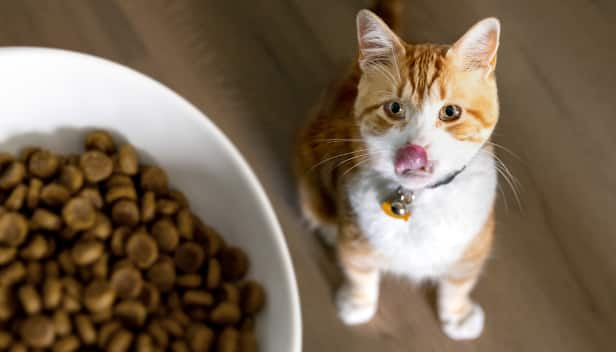

Food Sensitivities
Cats may experience reactions to certain ingredients, and they are identified through food elimination trials conducted by your veterinarian. A food elimination trial is a process of finding and removing the food ingredient causing skin issues or digestive upsets. Luckily, food sensitivities are uncommon in cats.
Managing a cat’s sensitivities
Managing a cat’s sensitivities can be a challenging process, and your first step should be visiting your veterinarian. They will help you find the right combination of nutrition, medication, and/or topicals for your cat.


Trust
Living with a cat with food sensitivities can cause you both to be restless, but the road to improvement will require time, patience and trust in your vet. Remember — just like humans, every cat is unique, and the best solution will come from working with a professional to address your pet’s specific needs. Together, you’ll get on the right track to helping your best friend feel like their best self.


Nutrition
Clinical nutrition plays an important role in the management of signs associated with sensitivities in cats. The right nutrition can promote healthy skin from within and help alleviate your cat’s signs quickly and long-term. Even with treatment, some cats may have recurring signs that will require adjustments along the way, and your veterinarian will be a helpful resource in managing your cat’s sensitivities.


Medication
A vet may prescribe medication to help alleviate your cat’s signs of sensitivities. If you are wondering what you can give your cat for sensitivities, only give medication as recommended by your vet.


Topicals
Topicals can be used for managing sensitivities in cats. There are various deliveries for topicals like shampoos, lotions, sprays, or ointments. Reach out to your veterinarian to ensure a specific topical is appropriate for your pet’s skin condition and life stage.


Understanding nutritional support for food sensitivities
You’ll want to ask your vet about a few things when it comes to a suitable cat food for food sensitivities. Ask about clinical nutrition cat food with a novel protein or hydrolysed protein that is unlikely to cause a reaction.


Time to see a veterinarian?
If you notice behaviour changes or sense something is off with your cat, it may be time to schedule a vet visit.
You also may want to ask your vet if clinical nutrition would be appropriate for your cat. Hill's Prescription Diet foods are developed by a team of Ph.D. nutritionists and veterinarians, and require a vet recommendation for purchase. Schedule an appointment so your vet can assess your pet's health and nutritional needs.
Talk to your vet about which nutrition is right for your pet.
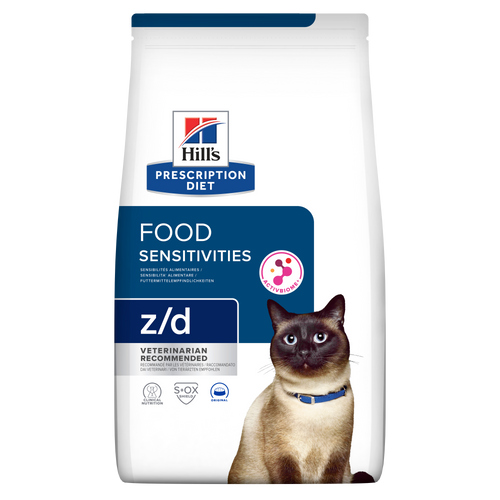
Formulated to reduce skin & digestive signs from food intolerances
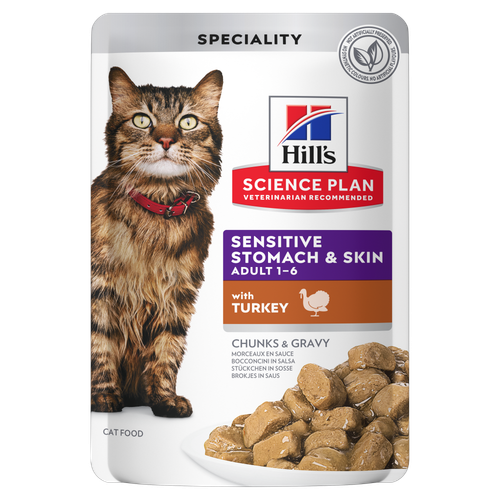
Hill's Science Plan Sensitive Stomach & Skin Adult Wet Cat Food with Turkey is a complete pet food for adult cats, aged 1–6 years. This highly digestible wet food comes in a pouch and supports healthy digestion, as well as nourishes skin and promotes a thick and lustrous coat.
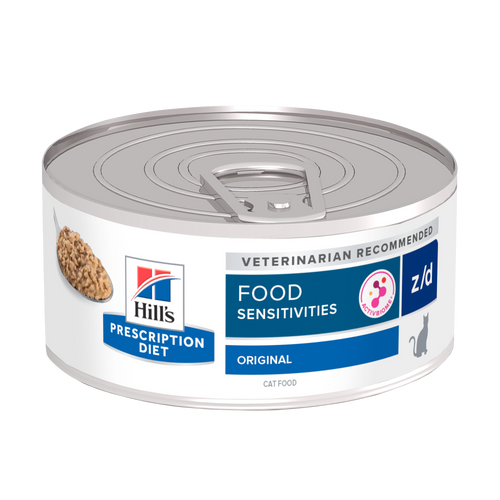
Formulated to reduce skin & digestive signs from food intolerances
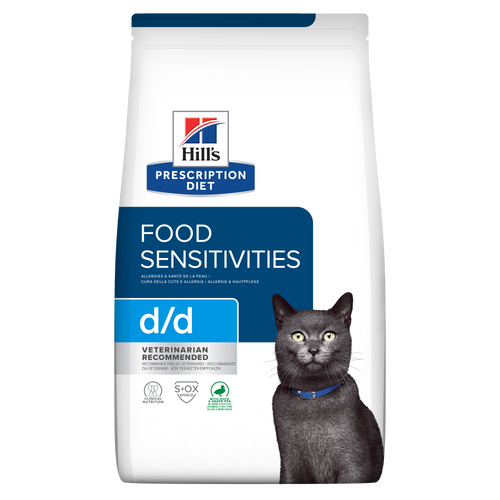
Hypoallergenic - helps reduce food intolerances and supports skin health
Related Articles

Discover why your cat may be itching and licking excessively, and what it could mean. Get expert advice on feline healthcare at Hill's Pet UK.
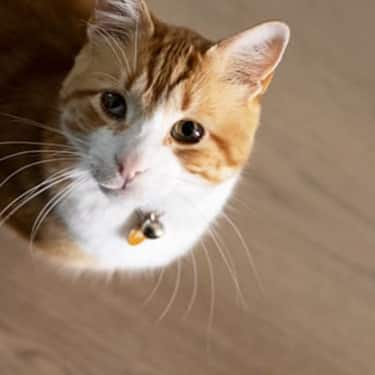
Understand common skin issues in cats and how to manage them effectively. Learn signs and prevention, and get care tips. Find out more at Hill's Pet.
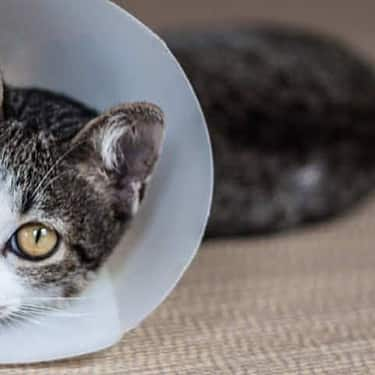
Explore how to recognise and address cat allergies. Get advice on identifying signs and care options. Learn more at Hill's Pet.
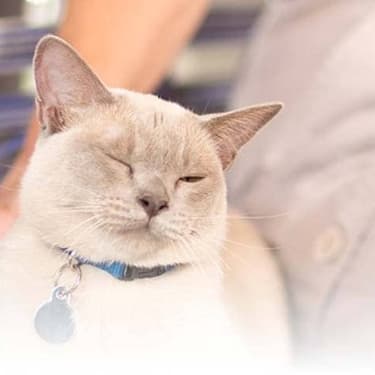
Learn about the causes of cat dermatitis, how to spot the symptoms and the best treatment options. Visit Hill's Pet for detailed guidance and tips.

